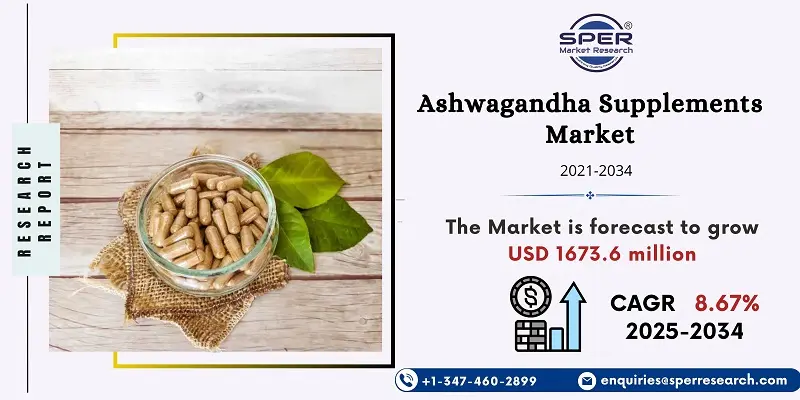
Ashwagandha Supplements Market Size, Trends, Analysis, CAGR Status, Revenue and Future Outlook
Ashwagandha Supplements Market Size- By Form, By Distribution Channel - Regional Outlook, Competitive Strategies and Segment Forecast to 2034
| Published: Feb-2025 | Report ID: FMCG2525 | Pages: 1 - 256 | Formats*: |
| Category : Consumer & Retail | |||


| Report Metric | Details |
| Market size available for years | 2021-2034 |
| Base year considered | 2024 |
| Forecast period | 2025-2034 |
| Segments covered | By Form, By Distribution Channel. |
| Regions covered | North America, Asia-Pacific, Latin America, Middle East & Africa and Europe. |
| Companies Covered | Dabur, Four Sigmatic, Gaia Herbs, Himalaya Wellness Company, KSM-66, Nature Made, Nature's Bounty, NOW Foods, Solaray, Swanson. |
- Global Ashwagandha Supplements Market Size (FY'2021-FY'2034)
- Overview of Global Ashwagandha Supplements Market
- Segmentation of Global Ashwagandha Supplements Market By Form (Capsules, Tablets & Pills, Powder, Liquid)
- Segmentation of Global Ashwagandha Supplements Market By Distribution Channel (Hospital Pharmacy, Retail Pharmacy, Online Pharmacy)
- Statistical Snap of Global Ashwagandha Supplements Market
- Expansion Analysis of Global Ashwagandha Supplements Market
- Problems and Obstacles in Global Ashwagandha Supplements Market
- Competitive Landscape in the Global Ashwagandha Supplements Market
- Details on Current Investment in Global Ashwagandha Supplements Market
- Competitive Analysis of Global Ashwagandha Supplements Market
- Prominent Players in the Global Ashwagandha Supplements Market
- SWOT Analysis of Global Ashwagandha Supplements Market
- Global Ashwagandha Supplements Market Future Outlook and Projections (FY'2025-FY'2034)
- Recommendations from Analyst
1.1. Scope of the report1.2. Market segment analysis
2.1. Research data source
2.1.1. Secondary Data2.1.2. Primary Data2.1.3. SPERs internal database2.1.4. Premium insight from KOLs
2.2. Market size estimation
2.2.1. Top-down and Bottom-up approach
2.3. Data triangulation
4.1. Driver, Restraint, Opportunity and Challenges analysis
4.1.1. Drivers4.1.2. Restraints4.1.3. Opportunities4.1.4. Challenges
5.1. SWOT Analysis
5.1.1. Strengths5.1.2. Weaknesses5.1.3. Opportunities5.1.4. Threats
5.2. PESTEL Analysis
5.2.1. Political Landscape5.2.2. Economic Landscape5.2.3. Social Landscape5.2.4. Technological Landscape5.2.5. Environmental Landscape5.2.6. Legal Landscape
5.3. PORTERs Five Forces
5.3.1. Bargaining power of suppliers5.3.2. Bargaining power of buyers5.3.3. Threat of Substitute5.3.4. Threat of new entrant5.3.5. Competitive rivalry
5.4. Heat Map Analysis
6.1. Global Ashwagandha Supplements Market Manufacturing Base Distribution, Sales Area, Product Type6.2. Mergers & Acquisitions, Partnerships, Product Launch, and Collaboration in Global Ashwagandha Supplements Market
7.1. Capsules7.2. Tablets & Pills7.3. Powder
7.4. Liquid
8.1. Hospital Pharmacy8.2. Retail Pharmacy8.3. Online Pharmacy
9.1. Global Ashwagandha Supplements Market Size and Market Share
10.1. Asia-Pacific
10.1.1. Australia10.1.2. China10.1.3. India10.1.4. Japan10.1.5. South Korea10.1.6. Rest of Asia-Pacific
10.2. Europe
10.2.1. France10.2.2. Germany10.2.3. Italy10.2.4. Spain10.2.5. United Kingdom10.2.6. Rest of Europe
10.3. Middle East and Africa
10.3.1. Kingdom of Saudi Arabia10.3.2. United Arab Emirates10.3.3. Qatar10.3.4. South Africa10.3.5. Egypt10.3.6. Morocco10.3.7. Nigeria10.3.8. Rest of Middle-East and Africa
10.4. North America
10.4.1. Canada10.4.2. Mexico10.4.3. United States
10.5. Latin America
10.5.1. Argentina10.5.2. Brazil10.5.3. Rest of Latin America
11.1. Dabur
11.1.1. Company details11.1.2. Financial outlook11.1.3. Product summary11.1.4. Recent developments
11.2. Four Sigmatic
11.2.1. Company details11.2.2. Financial outlook11.2.3. Product summary11.2.4. Recent developments
11.3. Gaia Herbs
11.3.1. Company details11.3.2. Financial outlook11.3.3. Product summary11.3.4. Recent developments
11.4. Himalaya Wellness Company
11.4.1. Company details11.4.2. Financial outlook11.4.3. Product summary11.4.4. Recent developments
11.5. KSM-66
11.5.1. Company details11.5.2. Financial outlook11.5.3. Product summary11.5.4. Recent developments
11.6. Nature Made
11.6.1. Company details11.6.2. Financial outlook11.6.3. Product summary11.6.4. Recent developments
11.7. Nature's Bounty
11.7.1. Company details11.7.2. Financial outlook11.7.3. Product summary11.7.4. Recent developments
11.8. NOW Foods
11.8.1. Company details11.8.2. Financial outlook11.8.3. Product summary11.8.4. Recent developments
11.9. Solaray
11.9.1. Company details11.9.2. Financial outlook11.9.3. Product summary11.9.4. Recent developments
11.10. Swanson
11.10.1. Company details11.10.2. Financial outlook11.10.3. Product summary11.10.4. Recent developments
11.11. Others
SPER Market Research’s methodology uses great emphasis on primary research to ensure that the market intelligence insights are up to date, reliable and accurate. Primary interviews are done with players involved in each phase of a supply chain to analyze the market forecasting. The secondary research method is used to help you fully understand how the future markets and the spending patterns look likes.
The report is based on in-depth qualitative and quantitative analysis of the Product Market. The quantitative analysis involves the application of various projection and sampling techniques. The qualitative analysis involves primary interviews, surveys, and vendor briefings. The data gathered as a result of these processes are validated through experts opinion. Our research methodology entails an ideal mixture of primary and secondary initiatives.



Frequently Asked Questions About This Report
PLACE AN ORDER
Year End Discount
Sample Report
Pre-Purchase Inquiry
NEED CUSTOMIZATION?
Request CustomizationCALL OR EMAIL US
100% Secure Payment






Related Reports
Our Global Clients
Our data-driven insights have influenced the strategy of 200+ reputed companies across the globe.




















